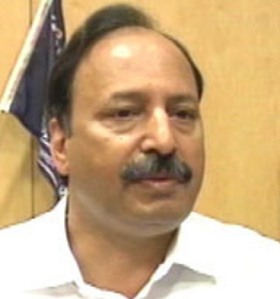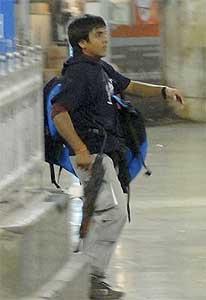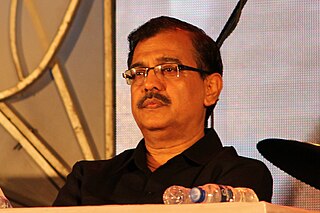
The 2008 Mumbai attacks were a series of coordinated terrorist attacks that took place in November 2008, when 10 members of Lashkar-e-Taiba, a Pakistan-based militant organisation, carried out 12 shooting and bombing attacks lasting four days across Mumbai. The attacks, which drew widespread global condemnation, began on Wednesday 26 November and lasted until Saturday 29 November 2008. A total of 175 people died, including nine of the attackers, with more than 300 injured.

Hemant Kamlakar Karkare, was the chief of the Mumbai Anti-Terrorism Squad (ATS). He was killed in action during the 2008 Mumbai attacks. In 2009, he was posthumously given the Ashoka Chakra, India's highest peacetime gallantry decoration.
Attribution of the 2008 Mumbai attacks were first made by the Indian authorities who said that the Mumbai attacks were directed by Lashkar-e-Taiba militants inside Pakistan. American intelligence agencies also agree with this attribution. Pakistan initially contested this attribution, but agreed this was the case on 7 January 2009. To back up its accusations, the Indian government supplied a dossier to Pakistan's high commission in Delhi. The Pakistan government dismissed the dossier as "not evidence," but also announced that it had detained over a hundred members of Jamaat-ud-Dawa, a charity linked with Lashkar-e-Taiba. In February 2009, Pakistan's Interior Minister Rehman Malik agreed that "some part of the conspiracy" did take place in Pakistan.

Mohammed Ajmal Amir Kasab was a Pakistani terrorist and a member of the Islamist terrorist organization Lashkar-e-Taiba through which he took part in the 2008 Mumbai terrorist attacks in Maharashtra, India. Kasab, alongside fellow Lashkar-e-Taiba recruit Ismail Khan, killed 72 people during the attacks, most of them at the Chhatrapati Shivaji Terminus. Kasab was the only attacker who was apprehended alive by the police.
Zakiur Rehman Lakhvi is a Pakistani Islamist militant, terrorist, and co-founder of Lashkar-e-Taiba. One of the prime perpetrators of the 2008 Mumbai attacks, he is featured on India's NIA Most Wanted list. In January 2021, he was arrested by Pakistani authorities and sentenced to three concurrent five-year sentences in jail for terror financing in an unrelated case.
Rakesh Maria is a former Indian Police Officer. He last served as the Director General of Home Guard. Before that he served as the Police Commissioner of Mumbai.

Tukaram Omble AC was an Indian police officer and a former member of Indian army who served as an assistant sub-inspector (ASI) of the Mumbai Police. He was killed in action during the 2008 Mumbai attacks, at Girgaum Chowpatty in Mumbai. The Indian government posthumously honoured Omble on 26 January 2009 with the Ashoka Chakra, the country's highest peacetime military award.

Ujjwal Nikam is an Indian special public prosecutor who has worked on prominent murder and terrorism cases. He helped prosecute suspects in the 1993 Bombay bombings, the Gulshan Kumar murder case, the Pramod Mahajan murder case, and the 2008 Mumbai attacks. He was also the special public prosecutor in the 2013 Mumbai gang rape case, 2016 Kopardi rape and murder case. Ujjwal Nikam argued on behalf of the state during the 26/11 Mumbai attack trial.

Yerawada is a neighbourhood of the city of Pune in the state of Maharashtra, India. Before that British Raj Yerawada was known as Yeraoda. Yerawada is one of the most densely populated areas in Pune. It is located at the beginning of Ahmednagar highway and also on the way to old Pune Airport at Lohagaon. This place can be reached after crossing Mula-Mutha River through Yerawada Bridge from Bund Garden.
Devika Rotawan is a survivor of the 2008 Mumbai attacks and a key witness who identified Ajmal Kasab during trial as a perpetrator of the attack. She was nine years old when she was shot in the leg during the attack in the Chhatrapati Shivaji Terminus, Mumbai.
Antisemitism in Pakistan is the presence of hostility and discrimination against Jews in Pakistan based on prejudices against the Jewish people and/or the religion of Judaism. Alongside the prevalence of general stereotypes, Jews are commonly subjected to negative views, feelings and rhetoric in Pakistan, most of which overlap with and are directly related to the antisemitic views prevalent throughout the Islamic world. Widely regarded as miserly within Pakistani Muslim circles, Jews residing in Pakistan have also faced periodic intolerance by the state, which has intensified since the Islamization period of the 1980s under Muhammad Zia-ul-Haq, who propelled Pakistan towards the adoption of strict and highly-conservative Islamic practices and laws. The Jewish population of Pakistan has rapidly decreased since the state's founding and separation from neighbouring India in August 1947, and as of 2019 estimates, stands at less than 200 people amidst Pakistan's total population of over 200 million, the majority of whom are Muslims.
Abbas Kazmi is a criminal lawyer who received wide media coverage for representing Ajmal Kasab, the prime accused in the 26/11 Mumbai terror attacks. In 2010, he was a contestant in the reality show Bigg Boss 4.

Yerwada Central Jail is a noted high-security prison in Yerwada, Pune in Maharashtra. This is the largest prison in the state of Maharashtra, and also one of the largest prisons in South Asia, housing over 5,000 prisoners (2017) spread over various barracks and security zones, besides an open jail just outside its premises. Many well known nationalist fighters individuals including Mahatma Gandhi and Jawaharlal Nehru have been jailed here.

Islam Gymkhana, is a gymkhana located along Marine Drive in Mumbai. Land for the gymkhana was allotted by the then Governor of Bombay, Lord Harris in 1890.
Sayed Zabiuddin Ansaria.k.a.Abu Hamza or Abu Jundal is an Indian Islamic militant belonging to Indian Mujahideen and Lashkar-e-Taiba. He is accused of being involved in 2008 Mumbai attacks. Zabiuddin Ansari 's name was listed in the list of "50 most wanted criminals sheltered in Pakistan" released by India on 21 May 2011. He served as the handler of the 10 LeT terrorists during 2008 Mumbai attacks.

The Attacks of 26/11 is a 2013 Indian Hindi-language action thriller film directed by Ram Gopal Varma, based on the book Kasab: The Face of 26/11 by Rommel Rodrigues about Ajmal Kasab, perpetrator of the 2008 Mumbai attacks. The film stars Sanjeev Jaiswal in his film debut, playing the role of terrorist Ajmal Kasab, with art direction by Uday Singh. It also features Nana Patekar in a pivotal role. A seven-minute promo of the film was released over the Internet on 23 November 2012.

Rommel Rodrigues is an Indian author, film director, screenwriter and producer based out of Mumbai. He has worked in several Indian newspapers, writing on crime, business, politics and current affairs for over two and a half decades and was accredited by the Maharashtra Government for nearly 10 years. He's a columnist and presently the editor of SEZ Times.
Sanjeev Jaiswal is an Indian actor known for his roles in Hindi films. Jaiswal made his debut in the film Shaitan in which he played the role of a police informer. He then featured in the film The Attacks of 26/11, a film based on the 2008 Mumbai attacks, in which he played lead role of Mohammed Ajmal Amir Kasab.
M. L. Tahaliyani is the Lokayukta of Maharashtra and is a retired Judge of the Bombay High Court. Justice Tahaliyani presided over high-profile cases including the 2008 Mumbai attacks and the Adarsh Housing Society scam.










